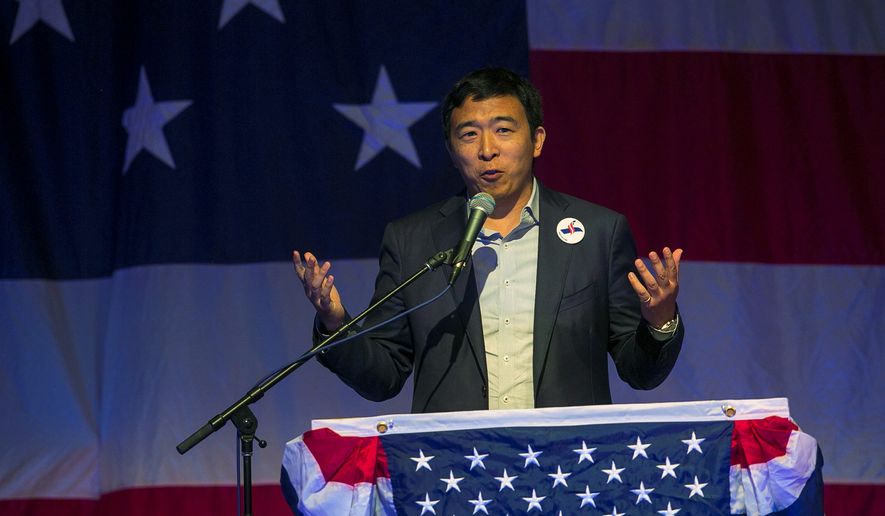If candidates are going to be rewarded for outside-the-box thinking in 2020, then don’t write off Andrew Yang’s underdog bid for president.
The 43-year-old entrepreneur and political newcomer has become a familiar face in Iowa, where he has centered his fledgling campaign on giving every U.S. citizen $1,000 per month. Mr. Yang’s sales pitch is anchored in an apocalyptic warning: The coming rise of robots, artificial intelligence and automation will eliminate truck driving and retail jobs across the country, and it demands that elected leaders adopt a “new economic vision.”
“We need to accelerate and evolve as an economy and a society and the most direct way to build a more human-centered economy is through a universal basic income or ’Freedom Dividend’ of $1,000 per adult per month,” Mr. Yang told The Washington Times. “But if we do not act in the face of this tidal wave, we are going to wind up in a much, much rougher spot than Donald Trump being president.”
On the stump, he casts himself as the perfect messenger, telling crowds, “With your leadership we can reverse the disaster of a presidency because the opposite of Donald Trump is an Asian man who likes math.”
Universal basic income, or UBI, is among a number of ideas that have been considered outside the mainstream and could get aired out in the 2020 Democratic presidential race.
Other issues that could make their way into the prime time conversation include giving Washington, D.C., and Puerto Rico statehood, adding seats in the House of Representatives and expanding the number of justices on the Supreme Court.
Mr. Yang said that he used to think that universal basic income was a far-fetched idea, but that changed after he learned that it has had a wide range of support — bringing together liberals, including Martin Luther King Jr., who viewed it as a way to combat poverty, and conservatives, such as economist Milton Friedman, who viewed it as a way to cut through the barrage of government programs.
The concept made its way into legislation in the 1970s that passed the House but died in the Senate.
Now billionaire entrepreneurs in Silicon Valley are backing the idea, including Elon Musk and Facebook founder Mark Zuckerberg. Another likely 2020 contender, South Bend, Indiana, Mayor Peter Buttigieg, has said the issue is worth debating.
“I come at it from a very pragmatic angle where I have been in so many rooms where we cook up these elaborate policy mechanisms to deliver on some goal like increased literacy rates by third grade,” Mr. Buttigieg told The Times. “We want more people to test at a third-grade level on reading and we come up with these tutoring schemes and all these things and there is some evidence that giving their parents $1,000 would do more pound for pound to allow that kid to be able to read in the third grade than anything else that we’ve come up with.
“So if that is the most efficient effective way to do it, let’s do it,” he said.
Other potential 2020 candidates aren’t ready to jump on board, opting instead to embrace a federal job guarantee.
Sen. Bernard Sanders of Vermont told Vox in 2016 that he is “sympathetic” to the approach. “I am more interested in universal employment opportunity,” Sen. Jeff Merkley of Oregon told The Times. “I think the rhythm of work is fundamental to the health of a family.”
Mr. Yang maintains the nation has the resources to pay for the estimated $2.5 trillion price tag and is putting his money where his mouth is — personally giving $1,000 a month to a family in Iowa and a family in New Hampshire in an attempt to illustrate how his plan would work.
A son of Taiwanese immigrants, Mr. Yang graduated from Brown University with a degree in economics and Columbia Law and became a banking lawyer in New York.
He later joined Manhattan GMAT, an education company that focused on test preparation, and rose to become the group’s president.
In 2011, he founded Venture for America, a nonprofit that recruits top college graduates from around the country, trains them, and places them with start-ups in cities in need of more talent such as Baltimore, Cleveland and Detroit.
The Obama administration appointed him in 2015 as an ambassador of Global Entrepreneurship.
Mr. Yang said Democrats must recognize that the loss of millions of jobs across the Midwest and the Rust Belt is what gave rise to President Trump.
“My friends in Silicon Valley know that we are about to do the exact same thing to millions of retail jobs, call center jobs, fast food jobs, truck driving jobs, and on and on through the economy,” he said.
Likening the economic transformation to a baseball game, Mr. Yang says the nation is in the “third inning of the greatest economic and technological transformation in the history of the world and the third inning has given us Donald Trump.”
“By the fifth or sixth inning this country is going to be unrecognizable,” he said.
• Seth McLaughlin can be reached at smclaughlin@washingtontimes.com.




Please read our comment policy before commenting.